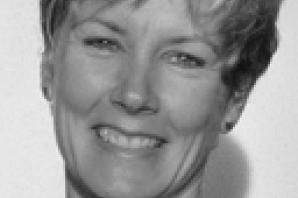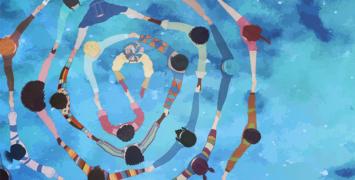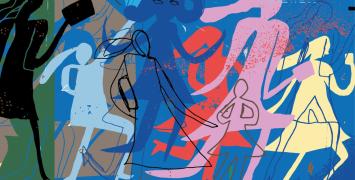United in diversity: how to live with difference in Europe?
Nowadays, European cities are witnessing unprecedented levels of migration and population change. In an era of super mobility and super diversity, how do people develop the capacity to live with difference? This question is asked by Professor Gill Valentine, a social scientist financed by the European Research Council (ERC). Her research is particularly pertinent in these times of economic crisis, as history has shown a hardening of attitudes towards 'others' in difficult periods. She will collect a unique set of data on everyday understandings of difference in the UK and Poland with the view to inform and nuance European policies and strategies in the field.

"Most of the writing about new urban citizenship is based on the assumption that contact with 'others' necessarily translates into respect for difference. This needs to be nuanced: many everyday moments of contact between citizens may not actually represent encounters at all", explains Prof. Valentine.
With her team, she wants to identify what kind of encounters produce 'meaningful contact' that actually changes values and translates into a more general positive respect of others. To address this question, she focuses on 'micropublics', i.e. sites such as libraries and sport clubs, where people from diverse backgrounds are brought together and can learn new ways of relating to each other.
"The capacity to live with difference confronts all countries of the EU, but there are some distinctions to make", notes Prof. Valentine. She distinguishes two important categories: the countries which were former colonial powers (such as UK, the Netherlands, France and Spain) and post-communist states in Eastern Europe (such as Poland, Latvia and Czech Republic). For the former ones, the challenges of multiculturalism have been faced since the post-war period. In contrast, it is only since 1989 that the homogeneity of former communist states has been significantly unsettled by contact with 'others'.
From Leeds to Warsaw - From research to politics
Prof. Valentine's programme of research aims to collect empirical data in two cities which she believes are representative: Leeds (UK) and Warsaw (Poland). Her research team is using innovative tools to collect testimonials, such as audio-diaries – to capture informants' reflections on their everyday lived encounters with difference – and time-lines built on in-depth life history interviews.
Her approach includes spatial experimentation. "With the help of ergonomics experts, movements therapists and architects, we aim to identify the types of activity and characteristics of particular spaces where meaningful contact can be produced or facilitated", explains Prof. Valentine.
"I have opted for a multidisciplinary approach, combining expertise from different fields including geography, urban studies, planning and sociology", she adds. The outcomes of the project will also leave a legacy beyond academic research. "I already have a collaborative relationship with the UK Equality and Human Rights Commission and I also expect strong interest from Polish government bodies and NGOs who are developing equality legislation and support for minority groups for the first time following their accession to the EU ", says Prof. Valentine.
On her €2.1 million ERC Advanced grant, she adds: "The ERC funding has been hugely important in enabling me to develop an interdisciplinary team of researchers at different career stages to address the important societal challenge of how we might develop the capacity for difference. It has enabled to work with a range of non-academic stakeholders and communities in both the UK and Poland which I hope will help us to generate findings that make a difference from the local to the European scale."
Looking forward, she plans to organise a two-day international conference in May 2014 where her findings will be showcased to European academics and 'stakeholder' dissemination workshops. In parallel, public exhibitions will also be organised in London, Warsaw and Brussels over the course of the year.






